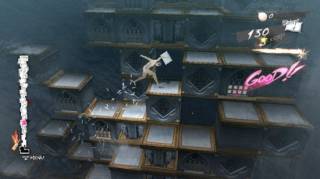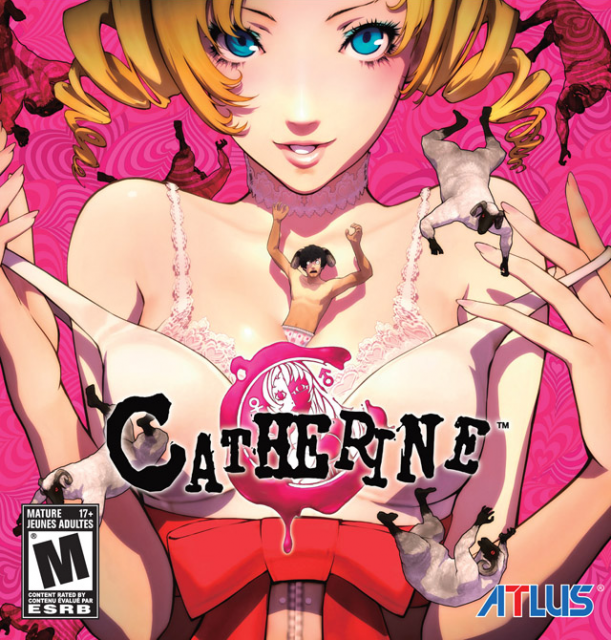And nitwits dream of electric sheep.
So I had recently been approached with the opportunity to write video game reviews for a website targeting teenage girls. Two thoughts popped into my head; one is that I can continue to procrastinate on editing that Spiderman Edge of Crap review I typed up weeks ago. Secondly, this would be a good chance to go reflect on my experience with this summer’s romance conspiracy puzzler, Catherine. After all, if there’s one thing teenage girls despise, its unfaithful men. Likewise, they may also like block puzzles, sake and baritone narrators. So should your very specific and unlikely combination of tastes match up, Catherine may also be for you.

Catherine was procreated by Atlus’ Persona team, the guys that made such hits as Persona 4 and I guess Persona 3. Many of the same sensibilities (or lack thereof) carry over into this demon child of a game. There is the best attempts of Japanese artists imitating American music since Bayonetta’s J-Pop version of Fly Me To The Moon. There is the litany of innuendos and hidden (often not well hidden) perverse imagery. There is an even bigger pile of exposition. There’s a divine supernatural force ca
using bad things to happen. There are many, many endings (including a very demented one that will go down amongst the annals of great game endings.) There is plenty of alcohol and sushi. I feel that for better of for worse, the legion of Persona 4 fans (and we are indeed legion, a loving legion at that) have already been sold on Catherine on virtue of really wanting more Persona 4.
This is not, in fact, more Persona 4. Though it would not surprise me to find out the protagonist of Catherine is also the silent hero of Persona 4, paying the price for all the simultaneous girlfriends he had within the Investigation Team. If that’s not the case, than your character is Vincent Brooks. He’s scared of the long-term commitment his girlfriend Katherine desires, whom also happens to be preggers with his kid. He also might be having an affair with a free-spirited ditz of a woman named Catherine. Also, people in his town are dying in their sleep of unknown causes. Also, he has dreams of being forced to climb a giant tower alongside many other sheep-like figures in the name of not croaking himself. Also, he has the unhealthy compulsion of going to the local bar Every. Single. Day. Nah, maybe teenage girls don’t want to relate to this game, nevermind.
Atlus’ intent for Catherine has an unlikely kind of ambition that I can’t recall ever seeing before on any game. Players are asked to choose between responsible commitment and unhinged freedom. I know this because I figured it out while playing. I unequivocally know this because the game felt obligated to explain its own themes to me point-blank. Subtlety has never been the strength of most Japanese game developers.
At the same time, the narrative doesn’t begin to get interesting until near the end of the game. That is largely on account of the game’s morality meter, and how it keeps Vincent from acting the way players want him to. Based on your choices, players fill a meter that swings between responsibility and freedom, and the side of the meter determines Vincent’s responses to certain scenarios. Well, in theory it does. In practice, he seems to respond to every conflict with tattered panic, indifference, stuttering, sweating and an inability to do anything but let the situation escalate.

At the least, I kept myself intrigued in the game’s murder mystery, and found the satisfying payoff within what the game deems the “True” endings. Now, the only way to get the true endings is to max out one side of the meter, which completely kills off the whole moral choice aspect. It means I’m no longer answering the game’s assorted dilemmas and moral issues based on my beliefs but rather for gameplay conceits. Call it the inFamous Syndrome.
Also, block puzzles. The actual game part of the game asks for players to manipulate cubes on a giant tower in a manner that allows Vincent to reach the top and mature as a person I guess. The blocks have their own unique ruleset that allows for many possible approaches to the top. (Multiple roads to walk before one becomes a man?) There are other variables, like power-ups strewn across the fields, or different block types like the block with a giant tongue as to make Catherine envious. There’s a surprisingly decent variety to what is otherwise the same form of tile manipulation to each of the game’s levels.
But I can’t claim to have enjoyed those block puzzles. I feel like it takes a certain kind of person to be able to navigate these geometric solutions. Someone with strong spatial skills, the kind that allows them to assemble the International Space Station with their mind. Even on the Easy difficulty setting, I found myself having to resort to move-for-move imitation of Youtube videos in order to climb these beasts and make Vincent’s parents proud.

Between puzzles, the game asks players to answer assorted random relationship questions. These should probably be approached with a more lighthearted flair than the game wants players to, with such issues as “would you change your wardrobe for your lover” or “your girl wants to see a Twilight movie, what do you do”? (Not really a question in the game.) After, the game gives you a pie chart explaining how other gamers answered, with most of the responses leaning towards the responsibility side. This tells me that either there is hope for mankind’s future, that most players went for the perceived “good” ending on their first playthrough, or that most gamers were playing while their girlfriends were in the room.
When Vincent is not dreaming of electric sheep, he’s probably at the local bar, talking to whomever is willing to share their woes with him. While at the bar, he can respond to texts from the various K/Catherines in his life, which affect that ever finicky morality meter. He can talk to the locals. He can drink beverages and get random trivia notes from the mysterious narrator. He can play an arcade game based some hybrid of Rapunzel and his nightmares. And he can change the songs on the jukebox to assorted unlockable tracks from past Shin Megami Tensei games, because Atlus knows its strongest suit. Naturally, the Persona 4 songs are the hardest to unlock, because Atlus hates me.
That really is the game portion of the game. You are either interacting with NPCs in a bar or climbing assorted block puzzles. Catherine becomes a weird game to recommend in that respect. What the game does well is so unique and specific that it takes a specific person to actually appreciate it. And yet, because its intentions are so different from every game on the market, I feel as though many young men and women kind of need to play it, if just to know. Men should look at Catherine to learn of the quandaries that come with coming of age. Women should look at it just to know what realities face the opposite sex. And I should play it as my holdover until that Persona 4 fighting game finally comes out here. Please hurry up.
3 ½ stars

0 Comments